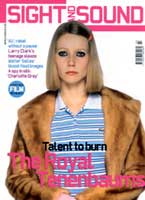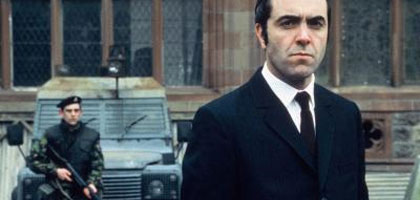
Bloody Sunday
UK/Ireland 2001

Reviewed by Richard Kelly
Synopsis
Our synopses give away the plot in full, including surprise twists.
Derry, 30 January 1972. MP Ivan Cooper (James Nesbitt) prepares to lead an anti-internment march by the Northern Ireland Civil Rights Association through the city's Catholic 'Bogside'. Major General Ford of the British Army (Tim Pigott-Smith) reminds journalists that such marches are illegal. Brigadier MacLellan (Nicholas Farrell) prepares an operation to apprehend suspected 'hooligans' on the march, spearheaded by paratroopers under Colonel Wilford (Simon Mann). Teenager Gerry Donaghy (Declan Duddy), previously arrested for rioting, assures his loved ones that he will avoid trouble. Cooper seeks assurance from the Provisional IRA that they will not initiate violence.
The marchers proceed on their pre-agreed route, but a group breaks away towards Army barricades and begins rioting. MacLellan authorises soldiers to fire water-cannon, rubber bullets and CS gas. Amid mounting chaos, shots are heard, and civilians are wounded. While Cooper addresses the gathering, the Paras move into the Bogside and fire live rounds at rioters.
Ford and Wilford advise the media of three civilian deaths, but at the city hospital Cooper learns there are 13 dead and 14 wounded. Debriefed, each paratrooper insists their targets were armed. Mortally wounded, Gerry is stopped at an Army roadblock, and nail bombs planted on his body. At a press conference, Cooper warns the British government that they have handed the IRA a propaganda victory.
Review
'We've just fired a fucking horrendous amount of ammunition, we've got to know why, and we've got to have some weapons.' Thus does writer-director Paul Greengrass imagine the Parachute Regiment's instant post-mortem on Bloody Sunday, voiced by Colonel Wilford of First Battalion ('One Para'). Thirty years on from the dire events of that day, the Paras still don't seem to have their story straight.
As Greengrass (whose last film was the ITV docudrama The Murder of Stephen Lawrence) reminds us in closing intertitles, Lord Chief Justice Widgery's subsequent inquiry swiftly decided that Wilford's men had met IRA gunfire as they entered the Bogside, and that several of the rioters then 'dropped' by Para sharpshooters were themselves armed. And yet the offensive weapons sought in justification of this carnage were not found. Thomas Kinsella's poem 'Butcher's Dozen' (1972) cast glaring light on the contradiction by giving a sardonic voice to one ghost of the civilian dead: 'A bomber I. I travelled light/Four pounds of nails and gelignite/About my person, hid so well/They seemed to vanish where I fell.'
So was Bloody Sunday, as Derry's city coroner pronounced it, an act of 'sheer unadulterated murder'? Any film-maker who ventures a verdict dissimilar to Widgery's will assuredly take immediate flak from those members of the British and Irish media who scorn and revile the Republican movement. But Greengrass' dramatic re-enactment, galvanised by documentary techniques, is so dense and alive with detail that it should be viewed attentively. Dublin's Ballymun estate makes a vulnerable stand-in for the Bogside, but Greengrass' feel for the map and timeline of real events is assured, while Ivan Strasburg's roaming camera and the deft use of elliptical fadeouts drive the action forward.
Greengrass picks his protagonist shrewdly in the pacifist Protestant MP Ivan Cooper, played by Cold Feet favourite James Nesbitt as an affable radical, ever-ready to lead a rousing chorus of 'We Shall Overcome'. Depicted as cannier than the firebrand figures of Eamonn McCann and Bernadette Devlin, Cooper roves the Bogside, glad-handing and trouble-shooting, joking with old ladies who invite him to Mass, spreading the gospel of peaceful protest. Crucially, the only man immune to Cooper's charm is the local Provo OC: 'Marching's not gonna solve this thing,' he mutters darkly.
As for the security forces, Greengrass evokes a chain of command stretched tenuously between Army HQ and the Paras in the field. The key link is Major General Ford (a breezily supercilious Tim Pigott-Smith), relaying the government line that the 'Derry young hooligans' should be taught a hard lesson. And at the sharp end of the walkie-talkie is Wilford (played by SAS veteran Simon Mann), instructing his Paras to 'scoop up' the 'yobbos' and return fire if fired upon. The red berets, mindful of recent army casualties in Belfast and Derry, psych each other up into attack mode, and Greengrass frames the troubled mien of Mike Edwards' Private 027 as a barometer of the rising aggression.
Still, once the thud of rubber bullets becomes the crack of live rounds, Greengrass contrives to have his camera elsewhere. We hear the first shots, but know not their provenance. Later, once the Paras are firing freely, we see angry marchers restraining gunmen among their own numbers (seemingly of the Official - rather than Provisional - IRA). But the Paras' final assault on Glenfada Park is plainly presented as a rampage, and Greengrass foregrounds the worst iniquities: Jim Wray, lying paralysed by one bullet, duly executed by a second at close range; and Barney McGuigan, shot in the head while waving a white hankie.
Greengrass closes on a prophetic note, Cooper's warning to the Brits ('You will reap a whirlwind') prefigured by grim-visaged youths queuing in the stairwell of the Creggan estate to receive firearms from an IRA quartermaster. (Shades here of the angriest ghost in Kinsella's 'Butcher's Dozen', who rails: 'England, the way to your respect/Is via murderous force, it seems;/You push us to your own extremes.')
Greengrass' achievement is such that there is little point in the further re-staging of Bloody Sunday as painful history-play. Interested viewers should look now to Lord Saville's ongoing inquiry at Derry Guildhall, established in recognition of Widgery's failings. A hugely sophisticated fusion of oral testimony and audio-visual evidence, Saville might yet establish a narrative of Bloody Sunday that is beyond question, one that Derry unquestionably deserves.
Credits
- Director
- Paul Greengrass
- Producer
- Mark Redhead
- Screenplay
- Paul Greengrass
- Director of Photography
- Ivan Strasburg
- Editor
- Clare Douglas
- Production Designer
- John Paul Kelly
- Music
- Dominic Muldoon
